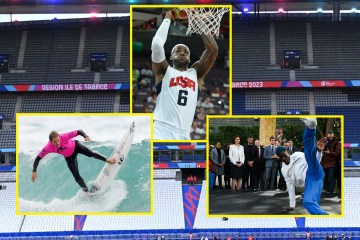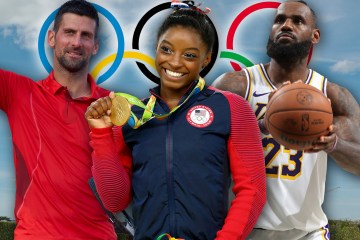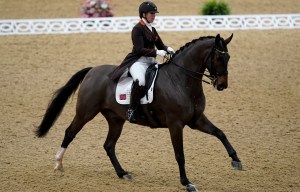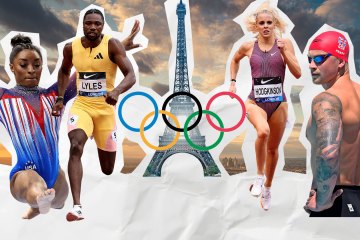
The Olympic Village has been a staple of the Games since Paris 1924 - but it's come a long, long way since then.
What started as just a number of cabins built for those competing at the nearby Stade de Colombes has now grown into a huge residential complex for athletes, complete with a cavernous dining hall, a bank and a post office... although the beds are made from cardboard.
A century on from its first iteration at Paris 1924, the Olympic Village is more sophisticated than ever.
The Paris 2024 Village has cost around €2billion (£1.7billion), is the size of 70 football pitches, and will house 14,000 athletes and entourage members during the Olympics. A further 9,000 athletes and their teams will then be welcomed for the Paralympics.
Located in the north of Paris, straddling Saint-Denis, Saint Ouen and L'lle-Saint-Denis on the River Seine, the Olympic Village will have some of the world’s best sports stars behind its gates.
Understandably, the complex has extremely high-security. But while it might be impossible to get inside during Paris 2024, we can give you a sneak peek of what the Olympic Village will be like during the Games.
Read more on Paris 2024
World-class facilities
The Paris 2024 Olympic Village was designed in collaboration with athletes from all over the world, who put forward their own ideas and requirements.
“We really took a step back to listen to different views and ensure that everything we decided was not based on a French or European vision, but instead was built to serve the needs of all athletes worldwide,” said the chair of the Paris 2024 Athletes’ Commission Martin Fourcade, when the Olympic Village was inaugurated in February.
The consultation process produced a complex of 82 buildings, 3,000 apartments and 7,200 bedrooms, with wide-ranging facilities including a 24-hour fitness centre, bank, post office, hair salon, multi-faith centre and medical clinic.
The 3,500-seater main dining hall will be a key part of athlete life in the Olympic Village. Around 40,000 meals a day are expected to be prepared during the Games, based on four themes – French, Asian, African-Caribbean and world cuisine. One-third of the 500 recipes made will be vegetarian.
There will also be a salad bar with more than 30 options, a meat grill, a cheese section, a bakery, a hot food buffet, a dessert bar and a wide range of fruits.
Athletes will not just be able to taste French delicacies – they will also be able to have a go at making them. A bakery in the Olympic Village will hold workshops teaching athletes how to make a perfect baguette.
Most read in Olympics
There will be specific training venues for fencing, modern pentathlon, wrestling, weightlifting, basketball and breaking, while the Village Club will allow athletes to relax, socialise and watch coverage of the Games.
Indeed, in contrast to Tokyo 2020, delegations will be encouraged to interact with each other during their time at the Olympic Village.
With Tokyo 2020 taking place during the coronavirus pandemic, Olympians had been asked to limit their physical contact with each other. These rules have clearly been lifted for Paris 2024 – the Olympic Village is set to stock 300,000 condoms, which have been handed out at the Games since Seoul 1988.
Organisers will still look to maintain a sense of peace and quiet in the Olympic Village for the athletes still preparing for competition, with director Laurent Michaud confirming there would be no alcohol available on site. But athletes looking to celebrate their success at the Games will easily be able to travel into the centre of Paris to party the night away.
Athletes with a fast-food craving will have to journey off-site to get their fix, too, with no McDonald's in the village this time. Previous Games saw competitors have their own Maccies restaurant on their doorstep, and the best part was that it was completely free! Usain Bolt admitted he was fuelled by chicken nuggets at London 2012 and Rio 2016, but athletes at Paris 2024 will not have the same privileges as McDonald's ended their long-standing partnership - which began in the 1970s - with the Olympics in 2017.
As for the apartments, athletes will share a bedroom with one other and a bathroom with three others. The beds are constructed with cardboard, but are sturdy enough to support 250 kilograms of weight.
The interior of the apartments look spartan, and some athletes have previously decided to skip the atmosphere of the Village to stay in more luxurious accommodation.
The US basketball team, which has previously included stars such as LeBron James and Kobe Bryant, are among those to not stay at the Olympic Village in the past. Novak Djokovic is another to have chosen to sleep in a hotel, although the tennis world No. 1 still visited the Village often during the Games.
Satellite villages across France… and Tahiti
While the Olympic Village in Paris will be the biggest residential complex during the Games, a number of satellite villages have also been constructed across France.
These will be situated in Châteauroux for athletes in the shooting competition, Lille Métropole for basketball and handball players, and Marseille for those in the sailing competition.
In addition, the surfing contest will take place more than 15,000km from Paris, on the powerful waves off the coast of Tahiti. Organisers have come up with a unique solution to house these athletes – they will be accommodated on a cruise ship anchored in Vairao Bay.
Meanwhile, the football tournament is set to be held in six cities alongside Paris – Bordeaux, Lyon, Marseille, Nantes, Nice and Saint-Etienne. Hotel accommodation has been found in each of these cities for the players.
Environmental credentials
The Olympic Village has been built to be as sustainable and environmentally friendly as possible, meeting Paris 2024’s ambition to be a low-carbon Games.
This means the Village has been constructed with organically-sourced materials and equipped with solar panels, as well as water reuse and air purification systems. It will aim to protect and encourage biodiversity with rooftops built to house insects and birds, and enclosures with openings for small animals to pass through.
A large part of the Olympic Village’s sustainable legacy will be its transformation after the Games into a residential neighbourhood. It will start to be repurposed in November 2024, leading to 2,500 new homes, a student residence, a hotel, gardens, parks, offices and shops. It is hoped this will meet the living needs of 6,000 residents.
Read More on talkSPORT
So once the Games are over and the athletes of Paris 2024 depart the Village, the legacy of the Olympics will still live on through these new residents.
The Olympics are on talkSPORT this summer, and you can tune in via our free online streaming service at talkSPORT.com














